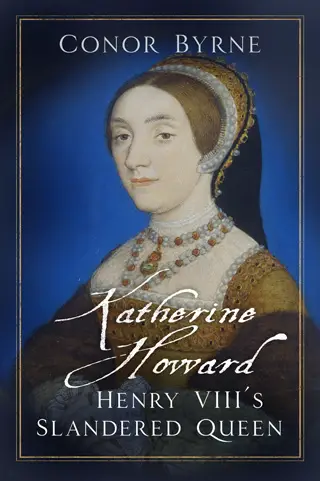Katherine Howard: Henry VIII’s Slandered Wife by Conor Byrne – Review

By Sandra Callard
Conor Byrne is one of the country’s major historians specialising in the Tudor era, and in particular the lives of the six wives of Henry VIII. His latest book delves into the life of, perhaps, the least-known of Henry’s six wives, Katherine Howard, who Henry courted, married and executed some two years later.
Katherine’s date of birth has always been difficult to ascertain, but Byrne’s exhaustive research seems to point to her being born between 1523 and 1525. This would make her about 17 when she married Henry in 1540, who was himself approaching 48. Howard was summarily executed in 1542 whilst still in her teens.
Katherine was a Howard, a niece of the powerful Duke of Norfolk, as indeed had been Anne Boleyn, who was a first cousin to Katherine. She was accused of the same crimes as Anne, which were treason towards the King by means of multiple adulteries, and was given no chance to defend herself before being found guilty.
Byrne’s exhaustive research leaves no stone unturned as he weaves his way through the tortuous and numerous state papers of the Tudor years. Slowly the information obtained thereby begins to exert a pull in varying directions as he gives the reader insights into the Tudor conventions and mores, which were indiscriminately hostile towards women as regards sex, childbirth or childlessness. All were the fault of the women, and even men’s sexual dysfunctions were thought to come from the wicked interactions of women.
“Appalling consequences”
 Byrne’s approach is scholarly and clear, but has a dry tone which seems to foretell the tragedy to come. Nevertheless his research and insight into Katherine’s early years is a startling indication of the predicament that faced her when Henry started to pursue her. Katherine was a noted beauty and it is clear from research, extant letters and her own admission that from the age of thirteen, when she may have been abused, she indulged in various sexual liaisons. This would have been known to close confidantes amongst her ladies in waiting, but apparently never reached the ears of her uncle, the Duke of Norfolk.
Byrne’s approach is scholarly and clear, but has a dry tone which seems to foretell the tragedy to come. Nevertheless his research and insight into Katherine’s early years is a startling indication of the predicament that faced her when Henry started to pursue her. Katherine was a noted beauty and it is clear from research, extant letters and her own admission that from the age of thirteen, when she may have been abused, she indulged in various sexual liaisons. This would have been known to close confidantes amongst her ladies in waiting, but apparently never reached the ears of her uncle, the Duke of Norfolk.
When Henry proposed to her he obviously had no idea of her past, which was as important as her present to Tudor thinking. Katherine’s dilemma was huge. Should she admit her past, bring shame on herself and the Howard dynasty, or stay quiet and hope Henry never found out? Katherine took the risk of her life, with appalling consequences.
The story is riveting. There is every incident therein for a Greek tragedy, and Katherine’s dilemma comes across loud and clear over the centuries, but Byrne’s steady and at times dull commentary wipes away the horror, tension and humanity of a life cut short by fear, inexperience and naivety. Katherine was used, abused and then killed by the testimonies of others who also lived in fear. There was little honour in a world where state murder was prevalent.
There is no proof that Katherine had sexual encounters after her marriage, but two things condemned her; her lying by omission and the fact that Henry needed a virgin queen. The real tour-de-force, however, could have been that, after two years of marriage Katherine, an apparently young and healthy girl, never fulfilled the reason why Henry married her, which was to produce a male child, the ‘spare’ that every king needed to secure his dynastic succession.
The onus on the historian is to produce the facts of history, preferably in an interesting manner. Byrne does the former in spades, but the human touch eludes him and turns an erudite and interesting book into a lavish stream of oft-repeated facts.
‘Katherine Howard: Henry VIII’s Slandered Wife’ by Conor Byrne is published by The History Press









